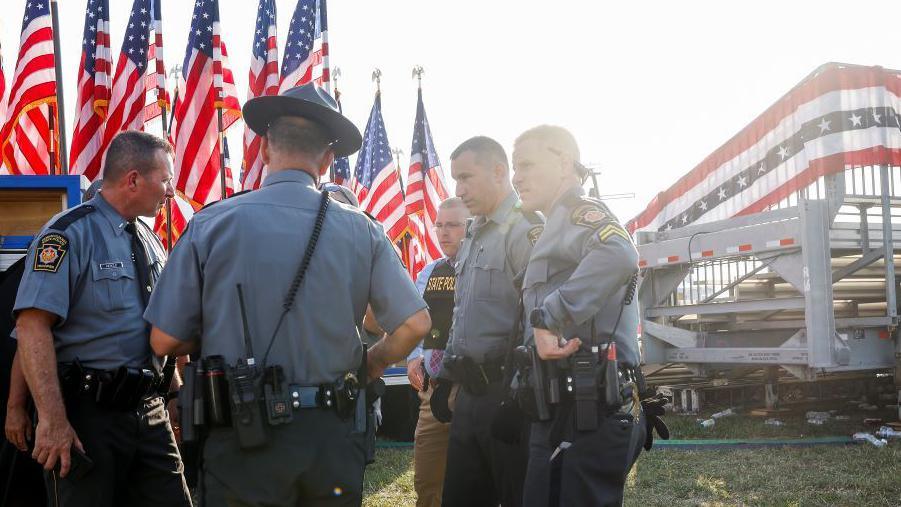Trump to be interviewed by FBI in shooting investigation

Multiple investigations have been launched into what went wrong in securing Butler Fair Show grounds on 13 July
- Published
Donald Trump has agreed to be interviewed by the FBI as part of its investigation into the assassination attempt at his rally in Pennsylvania earlier this month.
In a call with reporters on Monday, the FBI did not give a date for the interview, but said it would be "a standard victim interview we do for any other victim of crime".
"We want to get his perspective on what he observed," FBI Special Agent Kevin Rojek said.
Despite poring over mountains of evidence, investigators are yet to determine a motive to explain why Thomas Matthew Crooks opened fire on 13 July.
Newly released text messages, meanwhile, have revealed the 20-year-old was spotted by a local Swat team more than 90 minutes before the shooting - much earlier than previously thought.
The messages obtained by the New York Times and ABC News will add to the list of security failures that preceded the assassination attempt against the former president.
On Monday, the FBI said investigators believe Crooks conducted "careful planning" ahead of the 13 July rally and made "significant efforts" to conceal his activities.
That planning - which included six purchases of components for explosive devices - was conducted in a manner that would not "significantly raise the suspicions of his parents", Mr Rojek said.
Multiple investigations have been launched into what went wrong in securing Butler Fair Show grounds on 13 July.
Secret Service Director Kimberly Cheatle resigned after admitting failures.
On the day of the shooting, the agency was in charge of security within a fenced area and local law enforcement were responsible for areas beyond that.
At 16:19 local time (21:19 BST), the local police sniper texted two colleagues who were in the second floor of a warehouse overlooking the site, telling them he was clocking off.
As he left the building, he saw a young man sitting at a picnic table and notifed the others, saying in a text "someone followed our lead and snuck in and parked by our cars just so you know".
By 17:38 Crooks had moved from the table to the warehouse, an American Glass Research (AGR) building, and pictures of him were taken and shared in a group chat.
"Kid learning around building we are in. AGR I believe it is. I did see him with a range finder looking towards stage. FYI. If you wanna notify SS snipers to look out. I lost sight of him.”
Other messages obtained by CBS, the BBC's news partner, showed that at 17:51 a picture of Crooks was forwarded to a local officer, who said that commanders were "asking for a direction of travel".
About 20 minutes later, Crooks was dead, shot by the Secret Service after opening fire from the roof of an adjoining warehouse.
Relive a wild month in US politics in about two minutes
While the FBI investigation is focused on Crooks and his motivations - rather than any security failures that took place - Mr Rojek said investigators believe that he arrived at the venue at 13:50 on the day of the shooting, and flew a drone around the area for 11 minutes shortly after.
The FBI believes Crooks left the venue at approximately 16:00 before returning and being identified as a suspicious person shortly after 17:00.
At around 17:30, he was seen using a range finder, according to the FBI's timeline, just under half an hour before he was seen walking near the AGR building with a backpack.
At 18:11, he was confronted by a local police officer, about 30 seconds before he fired eight shots in the direction of Trump and the crowd.
Crooks is now believed to have conducted "early surveillance" of the site on 11 July, two days before the rally.
The newly published text messages extend the time period in which the 20-year-old gunman had provoked suspicion.
Previously reports established that he was on the radar of local law enforcement about an hour before the shooting.
Witnesses told the BBC moments after the shooting they had spotted the gunman on the roof and raised the alarm.
It is still unclear why there was a communications breakdown between local law enforcement and the Secret Service.
Members of the local Swat team told ABC News on Sunday they had no contact with the agency and a face-to-face briefing failed to happen.
On Monday, House Speaker Mike Johnson and Minority Leader Hakeem Jeffries also announced 13 members of a bipartisan task force that will investigate the attempt on Trump's life.
The committee - which is composed of seven Republicans and six democrats - includes Pennsylvania Republican Mike Kelly, whose district includes Butler, and Tennessee's Mark Green, the chairman of the Homeland Security Committee.
Acting Secret Service Director Ronald Rowe and FBI Deputy Director Paul Abbate will appear at a separate hearing before the Senate Homeland Security and Governmental Affairs committee on Tuesday.